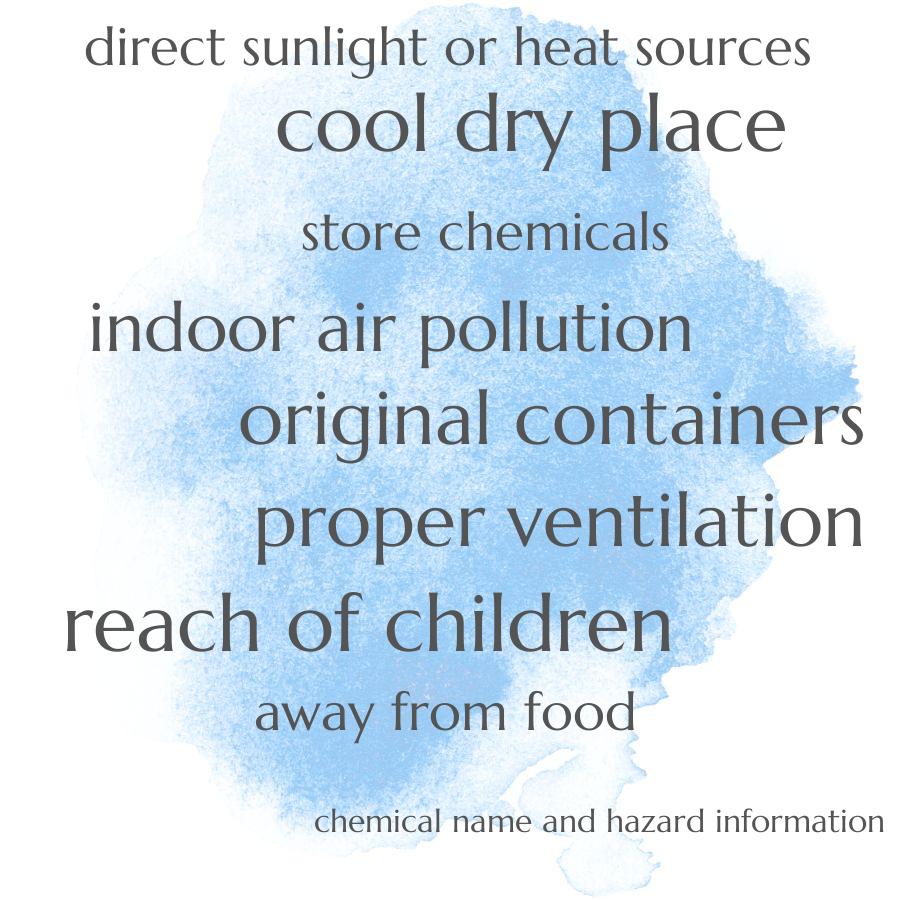Store chemicals in a well-ventilated area, away from direct sunlight and heat sources, and in their original containers with tightly sealed lids.
Indoor air pollution is a serious health hazard, and one of the biggest sources of this pollution are chemicals. Properly storing chemicals is essential to preventing indoor air pollution, but it can be difficult to know where to start.
In this blog post, we’ll discuss the best practices for properly storing chemicals in order to prevent indoor air pollution and keep your home safe and healthy.
Keep Chemicals in Their Original Containers

This helps to ensure that the chemical is properly labeled and stored correctly, reducing the risk of accidental spills or leaks. It also prevents any cross-contamination between different types of chemicals, which can be dangerous if inhaled or ingested.
Keeping chemicals in their original containers helps to maintain their potency and effectiveness over time. It allows for easy identification of the chemical should there be a need for disposal or emergency response.
Store Them Away From Food and Beverages
It is essential to keep these items separate to avoid contamination of food or drinks, as well as potential health risks associated with exposure to hazardous chemicals. When storing chemicals, it is best practice to place them in a cool, dry area that is out of reach of children and pets.
All containers should be clearly labeled with the name of the chemical and any relevant safety information. This will help ensure that everyone in the home knows what they are dealing with when handling the product.
It is important to regularly check for signs of leakage or damage on containers holding hazardous materials; if any are found, take appropriate action immediately by disposing of them safely according to local regulations.
Keep Them Out of Reach of Children and Pets
It is essential to keep all chemicals out of reach of children and pets, as they may be tempted to touch or ingest them. This can lead to serious health risks if the chemical is toxic or corrosive.
To ensure that these substances are stored safely, it is best to place them in a secure cabinet or shelf that cannot be easily accessed by young children and animals. It is important to label each container clearly with its contents so that everyone knows what the substance inside is and how it should be handled.
Make sure any containers are tightly sealed when not in use so that no fumes escape into the air. By following these simple steps, you can help protect your family from potential harm caused by hazardous chemicals indoors.
Store in a Cool Dry Place Away From Direct Sunlight or Heat Sources
This means that the area where the chemicals are stored should be kept at a temperature below room temperature and away from any sources of heat such as radiators, stoves, or other appliances. It should not be exposed to direct sunlight which can cause the chemicals to break down and release harmful fumes into the air.
It is also important to make sure that any containers used for storing these chemicals are sealed tightly so that no vapors can escape into the air. It is best practice to store all hazardous materials in a separate area away from living spaces and out of reach of children and pets.
Label All Containers With the Chemical Name and Hazard Information
Labeling should include the chemical name and any hazard information associated with it. This will help ensure that everyone who comes into contact with the container knows what is inside and how to handle it safely.
Proper labeling also helps reduce the risk of accidental exposure, which can lead to serious health problems if inhaled or ingested. Labels provide a quick reference for emergency responders in case of an accident or spill.
By taking the time to properly label all containers containing chemicals, you can help protect yourself and others from potential harm caused by indoor air pollution.
Use Proper Ventilation When Handling Chemicals Indoors
Ventilation helps to reduce the concentration of airborne particles and gases, which can be hazardous if inhaled. It also helps to disperse any fumes or vapors that may be released from the chemical, so they do not accumulate in one area.
When using chemicals indoors, make sure there is adequate ventilation by opening windows or using fans to circulate air throughout the room. It is important to keep all containers tightly sealed when not in use and store them away from heat sources such as stoves or radiators.
This will help ensure that no harmful fumes are released into the air while storing these chemicals.
Dispose of Unused or Expired Chemicals Properly
Unused or expired chemicals should never be poured down the drain, flushed down the toilet, thrown into a trash can, or left out in open containers. Instead, these chemicals should be taken to a hazardous waste disposal facility for proper disposal.
It is also important to check with local authorities for specific instructions on how to properly dispose of certain types of chemicals. It is best practice to store all chemical products in their original containers and label them clearly so that they are not mistaken for food items or other household products.
This will help ensure that any potential hazards associated with these products are minimized and prevent accidental exposure from occurring.
Read Also
- How to Reduce the Amount of Pet Dander in the Home’s Air
- 9 Ways to Improve Indoor Air Quality During Home Renovations
- How to Properly Ventilate Your Home to Improve Indoor Air Quality
- How to Maintain Good Indoor Air Quality During the Winter Months
- Can Cleaning Products and Household Chemicals Affect Home Air Quality?